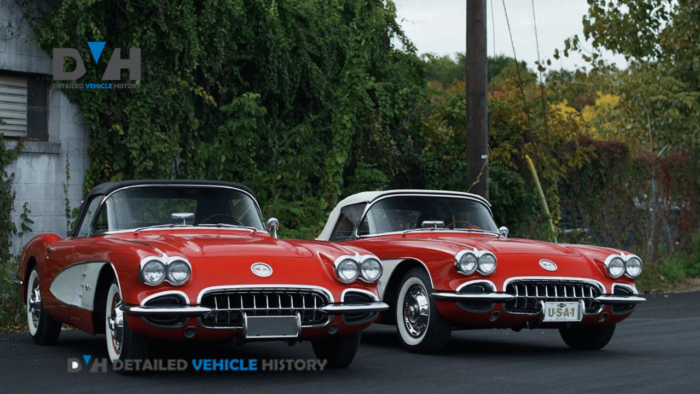Classic car imports captivate the passion of automotive enthusiasts, who hold a special place in their hearts for the elegance and timeless design of these vehicles. The allure of owning a piece of automotive history through classic car imports is undeniable, drawing many enthusiasts to embark on this nostalgic journey.y.
However, importing a classic car involves a unique set of challenges and considerations, and one of the most crucial aspects is understanding the vehicle’s history.
In this guide, we’ll explore the world of classic car imports, discuss the costs involved, and introduce Detailed Vehicle History as the first in the industry to provide comprehensive records on classic vehicles.
Classic Car Imports: A Timeless Passion
Classic car imports involve purchasing vintage or antique vehicles from other countries and bringing them into your own country.
There are several reasons why people are drawn to classic car imports:
- Unique Designs: Classic cars boast distinctive, eye-catching designs that often stand out from modern vehicles.
- Historical Significance: Many classic cars have historical significance, having been driven by iconic figures or featured in memorable events.
- Nostalgia: Owning a classic car can evoke nostalgia for a bygone era, connecting enthusiasts to the past.
- Investment Potential: Some classic cars can appreciate in value over time, making them attractive investments.
- Personal Connection: Enthusiasts often have a personal connection to a particular make or model, fueling their passion for classic cars.

How Much Does It Cost To Import A Car?
When considering classic car imports and even auction export cars, it’s essential to understand the costs involved.
While the exact expenses can vary widely based on factors like the car’s age, condition, and origin, here are some common costs associated with importing classic cars:
- Purchase Price: The cost of the car itself can vary dramatically based on factors like the make, model, rarity, and condition. Collectible classics can command premium prices.
- Import Duties and Taxes: Importing a classic car often entails paying import duties and taxes in your country. The amount can depend on the vehicle’s value and the applicable tax rates.
- Shipping Costs: Transporting the classic car from its country of origin to your location involves shipping fees, which can vary depending on the shipping method (container, RoRo shipping, etc.) and the distance.
- Customs and Documentation: You’ll need to navigate customs clearance, which includes document processing and fees. Ensure you have all the required documentation, such as the bill of sale and import permits.
- Inspection and Compliance: Some countries have strict emissions and safety standards that classic cars must meet. Modifying the vehicle to comply with these standards can be an added expense.
- Transport Insurance: Insuring the classic car during transportation is crucial to protect your investment. The cost of insurance will depend on the car’s value and the shipping method.
- Storage and Maintenance: If the classic car is not immediately roadworthy or if you’re not ready to use it, you may incur storage and maintenance costs.
- Registration and Licensing: Once the car arrives in your country, you’ll need to register and license it, which includes paying fees and obtaining appropriate license plates.
To ensure you’re making a well-informed purchase, consider using a reliable classic car VIN decoder provider to obtain a comprehensive vehicle history report, which is especially crucial for classic cars with long histories.
Read also: 7 Affordable Classic Cars

The Importance of Classic Car History Report
When it comes to classic car imports, understanding the vehicle’s history is paramount.
Classic cars can have intricate pasts, including multiple owners, various restorations, and potential modifications.
A thorough classic car history report can provide insights into the car’s:
- Ownership History: Discover who has owned the car throughout its lifetime, including any notable figures or collectors.
- Restorations and Modifications: Learn about any significant restorations or modifications that have been made to the vehicle. This can impact its originality and value.
- Accident and Damage History: Find out if the car has been involved in accidents or suffered significant damage over the years. This can affect its structural integrity.
- Maintenance Records: Access records of the car’s maintenance and servicing, shedding light on its overall condition and care.
- Title Status: Ensure the car has a clear title and verify that it’s free from liens or encumbrances.
Introducing Detailed Vehicle History: The Classic Car Authority
While vehicle history reports have been a staple in the used car market, Detailed Vehicle History is pioneering the industry by providing comprehensive records on classic vehicles.
Here’s why Detailed Vehicle History is the go-to source for classic car history reports:
- Extensive Classic Car Database: Detailed Vehicle History boasts an extensive database specifically dedicated to classic cars. This database covers a wide range of makes, models, and eras, ensuring that you can access historical records for the classic vehicle you’re interested in.
- Comprehensive Classic Car Reports: Our classic car history report is not limited to basic information. It provides an insight into a vehicle’s history, encompassing ownership history, restorations, modifications, accidents, maintenance records, and title status.
- Unparalleled Accuracy: We pride ourselves on the accuracy and reliability of our classic car reports. We source data from reputable providers to ensure the information you receive is trustworthy.
- Ease of Access: Obtaining a classic car history report from Detailed Vehicle History is a user-friendly process. Our website and interface are designed to provide quick and convenient access to the information you need.
- Affordability: We understand that classic car enthusiasts come from diverse backgrounds, and our pricing reflects that. Detailed Vehicle History offers affordable classic car history reports, making them accessible to all.
- Unmatched Expertise: Our team comprises automotive enthusiasts and experts who understand the unique needs of classic car buyers. We’re dedicated to providing you with the most comprehensive and accurate classic car history reports.
European Car Imports: A World of Possibilities
Europe is a treasure trove of classic cars, with various countries offering unique models and histories. Here are some popular destinations for European car imports:
- Germany: Germany is home to iconic automotive brands like Porsche, Mercedes-Benz, and BMW. Enthusiasts often seek classic models from these manufacturers.
- Italy: Italy is synonymous with luxury and style, producing classics like the Ferrari, Cord, Lamborghini, and Alfa Romeo. Italian classic cars are celebrated for their elegance and performance.
- France: French classics, including Citroën, Peugeot, and Renault, are known for their innovative designs and quirky charm.
- UK: The United Kingdom has a rich history of classic cars, with brands like Jaguar, Aston Martin, and Rolls-Royce commanding global admiration.
- Sweden: Sweden is famous for classic Volvo and Saab models, known for their safety features and durability.
Read also: Easily Import Classic Cars From USA to Chile
Ukraine Car Import Tax: A Consideration for European Imports
When importing classic cars from European countries like Ukraine, it’s essential to be aware of any applicable import taxes and duties.
Ukraine, like many other countries, imposes import taxes and fees on vehicles brought into the country.
The exact tax rates can vary based on factors such as the car’s age, value, and engine size.
Ensure that you research and understand the Ukraine car import tax regulations before proceeding with your classic car import.
Classic car imports offer a thrilling opportunity to own and cherish a piece of automotive history.
However, it’s crucial to approach the process with care and diligence.
Understanding the costs involved, obtaining a comprehensive classic car history report from Detailed Vehicle History, and being mindful of import tax regulations are all essential steps to ensure a successful and rewarding classic car import experience.









